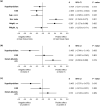The impact of severe nephrotic syndrome on thyroid function, nutrition and coagulation
- PMID: 39323731
- PMCID: PMC11422718
- DOI: 10.1093/ckj/sfae280
The impact of severe nephrotic syndrome on thyroid function, nutrition and coagulation
Abstract
Background: Nephrotic syndrome (NS) is characterized by urinary loss of proteins, including hormones and their carrier proteins, potentially resulting in endocrine disorders. This study aimed to assess thyroid dysfunction frequency and potential implications in NS.
Methods: In this case-control study, patients with severe NS (serum albumin ≤2.5 g/dl) and controls without proteinuria were evaluated for thyroid, haemostatic and nutritional parameters, including body composition.
Results: A total of 42 nephrotic and 40 non-proteinuric patients were enrolled. The NS group showed higher thyroid-stimulating hormone and lower free hormones, corresponding to a higher frequency of both euthyroid sick syndrome {ESS; 36% versus 5%; odds ratio [OR] 10.6 [95% confidence interval (CI) 2.2-50.0]} and hypothyroidism [31% versus 5%; OR 8.5 (95% CI 1.8-40.7)] compared with the control group. Levothyroxine supplementation was required for 11 NS patients (26% of the NS group). In addition, compared with control individuals, NS patients exhibited lower lean tissue mass and a trend towards hypercoagulability, which was evidenced by higher levels of most coagulation factors and fibrinolysis inhibitors, and reduced endogenous anticoagulants activities. Furthermore, NS patients with ESS presented with a 10.4 kg (95% CI -18.68 to -2.12) lower lean tissue mass. Those with hypothyroidism had significantly reduced activity of coagulation factor X [by -30% (95% CI -47 to -13)] and protein S [by -27% (95% CI -41 to -13)] compared with euthyroid NS individuals.
Conclusions: Thyroid dysfunction is common in severe NS, often necessitating levothyroxine supplementation, which supports routine thyroid workup. A potential link between thyroid, nutritional and coagulation disorders in NS requires further investigation.
Keywords: coagulation; hypothyroidism; nephrotic syndrome; nutrition; thyroid dysfunction.
© The Author(s) 2024. Published by Oxford University Press on behalf of the ERA.
Conflict of interest statement
A.K. received grant support from CSL Vifor and Otsuka and consultancy fees from Amgen, AstraZeneca, Boehringer Ingelheim, CSL Vifor, Delta4, GlaxoSmithKline, Novartis, Otsuka, Roche and Walden Biosciences. The remaining authors have declared no conflicts of interest.
Figures



References
LinkOut - more resources
Full Text Sources
Miscellaneous

